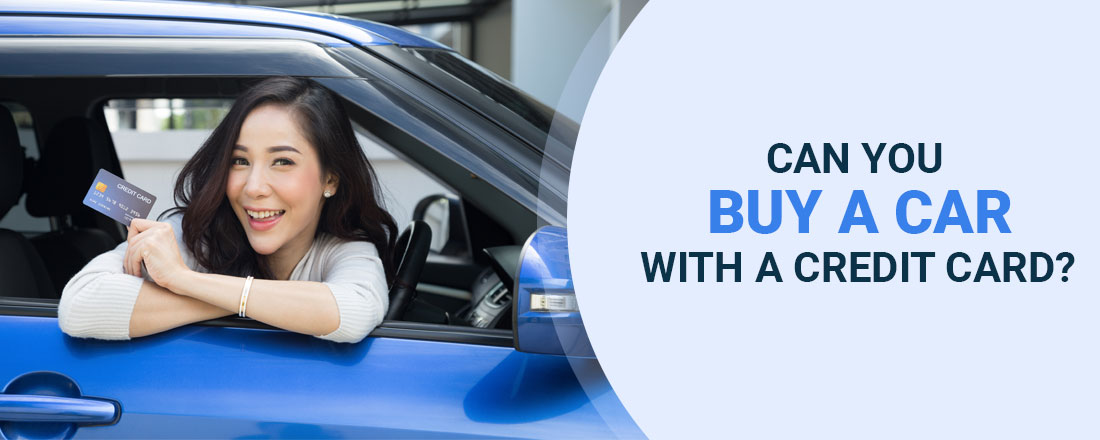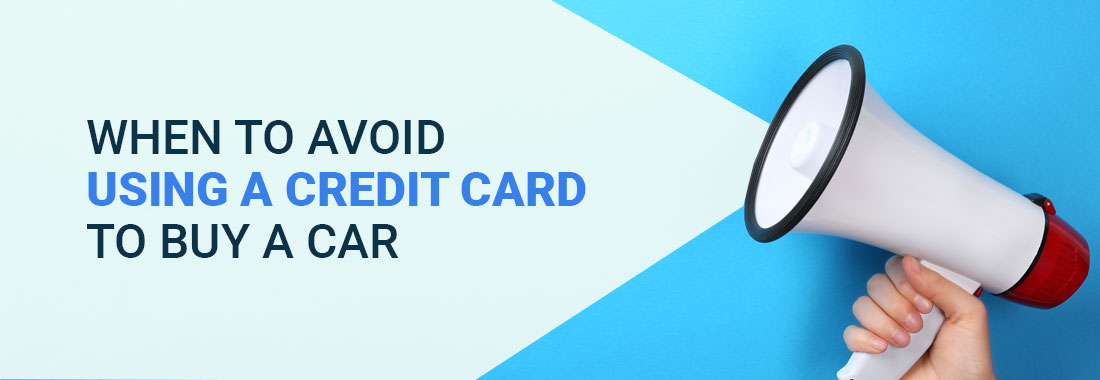
In an age when credit cards offer all sorts of benefits – from free
And aside from a house, there are few big-ticket items as big as a car. Which naturally leads to the question: Can you buy a car with a credit card?
The short answer is: Yes, probably.
The longer answer is: It really depends.
So, here’s everything you need to know about how to buy a car with a credit card.
This Article Will Cover
- How Can You Buy A Car With A Credit Card
- Your Checklist When You Buy A Car With A Credit Card
- When Does Buying A Car With A Credit Card Make Sense?
- When To Avoid Using A Credit Card To Buy A Car
How Can You Buy A Car With A Credit Card
Obviously, you have a few ways to pay for a new car purchase: you can pay cash; you can pay with a cashier’s check; you can get a loan from a bank or the auto-dealer’s financing unit; or, in some cases, you can buy a car with a credit card.
Paying cash for a car or using a cashier’s check doesn’t make a whole lot of sense from a financial-benefits point of view. You get no
The average car in America today costs about $35,000, according to Kelly Blue Book. That’s $525 with a 1.5%
If you’re more into airline miles, putting a $35,000 car onto a credit card tied to your frequent-flyer program you’re looking at enough
But here’s the most important consideration to keep in mind when you buy a car with a credit card: Make sure you have the money to pay off the card. I cannot stress this enough.
Credit cards can be a very expensive form for financing once the interest rate kicks in on your purchases. And you do not want to have interest rates or 17% to 21% or more imposed on such a large purchase.
If you don’t have the cash, then do not buy your car with a credit card. Period. In that case, financing the car through the dealer or through your local bank is the smarter approach. The dealer will likely have special low-rate financing options automakers use to move their cars at certain periods of the month or year … and, if nothing else, your local bank or credit union will offer auto loans with normal rates, currently in the 4.5% to 5.5% range.
In such a case, you might at least use your card for the down-payment and collects some
Your Checklist When You Buy A Car With A Credit Card
1) Ask Your Car-dealer First.
First, ask your dealer, “Can I buy a car with a credit card?” Many will say yes, but not all will because of the fees of between about 1.2% and 3.5% that credit-card companies impose on merchants. That reduces the dealer’s profit margin on the car.

Also determine what types of card the dealer will take, since not all will accept every flavor of credit card.
2) What Is Your Credit Limit?
You can’t go buy a $35,000 car if your credit limit is $10,000.
Of course, you can pay for your car purchase with multiple credit cards (collecting
If nothing else, you can pay for a large part of the car with your card and then pay the balance with cash, a cashier’s check or a loan from the dealer or the bank. Again, be sure you have the cash to repay whatever amount you put on your credit card.
If you’re looking for a
- Chase Freedom Unlimited: 0% APR for 15 months. $150 bonus after spending $500 in the first three months. 1.5% cash back on all purchases.
No annual fee.
- Capital One VentureOne Rewards: 0% APR for months. 20,000 bonus after spending minimum required amount. Reward miles for every dollar spent. No annual fee.
Or, you can always call your credit-card company and request a temporary (or permanent) credit-line increase to handle the purchase. Just tell your card company that you’re buying a car with your what you’re credit card, and that you will repay the balance immediately.
3) Prepare Your Credit-card Company
Given the amount of credit-card fraud, a sudden, large, unexpected charge for tens of thousands of dollars will likely raise red flags with your credit-card company, which will then probably deny the charge.
To mitigate this, call your card company first. Ask them, just as you did the dealer, “Can I buy a car with my credit card?” They’ll like to say yes, and then you can inform the card company of your plan to make a large purchase and that you will be paying off the charge quickly. That way your transaction will go through unimpeded.
When Does Buying A Car With A Credit Card Make Sense?
The Card Imposes 0% Interest On New Purchases.
A
Just be sure you pay off the balance on your card before the 0% APR period is over, otherwise, you will pay a high interest rate when the card resets, and that will be four- to five-times higher than a traditional car loan.
You Get Cash Back, Travel Rewards Or Sign Up Bonuses.
This is the primary reason to buy your car with a credit card: the benefits.
As I pointed out earlier, if you bought a car with the Citi Double Cash® Card card, you get the 1% cash when you buy, and 1% when you pay off the card. With Capital One Venture, you get tens of thousands of miles, potentially enough for a free vacation.
If you apply for a new card to make your car purchase, you’ll also get the
Pro tip: Apply for a new
When To Avoid Using A Credit Card To Buy A Car
You Don’t Have The Cash To Repay The Charge Immediately.
If you need an auto-loan, then stop reading. Buying a car with a credit card that you will repay over time is a horrible idea.
The interest rate you will pay on the credit card will lead to monthly credit card payments far larger than you’d pay with a car loan. Moreover, you’ll consume a large portion of your available credit – your credit utilization rate – and that will negatively impact your credit score, which, in turn, can hurt you in other areas of your financial life.

Your Credit Card Doesn’t Have A Grace Period.
Most credit cards have a grace period – the period in which the card issuer doesn’t charge interest on a purchase. It’s typically between 21 and 25 days after the current billing cycle ends.
But sometimes grace periods go away for certain reasons, or don’t exist for a particular card. And if you’re in that situation with your credit card, then you will be charged interest from day one when you buy a car with a credit card – or more than $550 worth of interest in the first month on a card that changes a fairly standard 19% APR. So just be cognizant of this possibility.
The Wrap Up
When it comes to the question of “Can I buy a car with a credit card” – or, really, using your credit card for any big-ticket purchase – the number one rule is to be certain that you have the cash to repay the cost. Otherwise, the financing charges credit-card companies impose means your car purchase on a credit card makes little financial sense.
That said, if you do have the cash, and if your dealer allows it and your credit-card company is prepared for it, buying your car with a credit card is a great way to collect
And we want to know: What is the biggest big-ticket item you’ve ever put on your credit card?
Tell us in the comments below.
